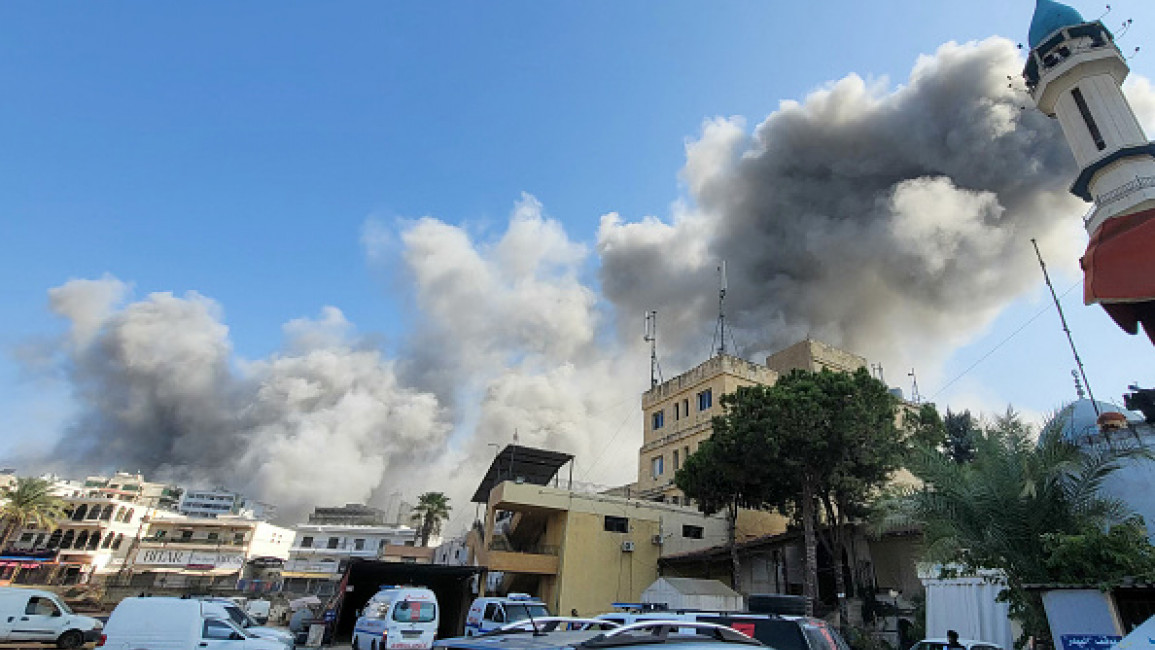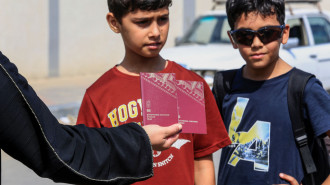Israel strikes Beirut after days of calm, kills dozens in south Lebanon, including mayor
Israel struck Beirut early on Wednesday only a day after the US had reportedly given assurances that its top ally would ease attacks on the Lebanese capital.
Three strikes hit Haret Hreik, south of Beirut, just less than an hour after evacuation orders were issued by the Israeli forces, which claimed they had targeted a Hezbollah "weapons storage".
The strikes came after nearly a week of calm in the Lebanese capital's southern suburbs, which has been battered by attacks since Israel widened its war on Lebanon a month ago.
The region saw heavy strikes on a near-nightly basis prior to last week that have destroyed many buildings and killed and injured scores of people.
Most people have already evacuated the area.
Beirut itself has seen three attacks since last month, targeting members of a Palestinian faction, paramedics, and a senior political Hezbollah figure which killed dozens of civilians.
The last strike on Thursday last week killed at least 22 people after levelling an entire building, as the fate of Wafik Safa – Hezbollah’s head of liaison and communique – remains unknown.
Sonic booms were also heard over Beirut on Wednesday.
US State Department spokesperson Matthew Miller had said Tuesday that Washington opposes the bombing campaign that Israel has carried out in the Lebanese capital and its suburbs in past weeks.
Lebanese caretaker Prime Minister Najib Mikati had also said that the US informed him that Israel would limit its strikes on Beirut.
"During our contacts with the American authorities last week, we received a kind of guarantee to reduce the escalation in the southern suburbs and Beirut," Mikati said in a written statement distributed by his office.
He did not provide further details on the assurances but said that Washington was "serious about pressuring Israel to reach a ceasefire".
Lebanon’s caretaker Health Minister Firas Abyad told Al-Hadath TV that more than 150 health workers have so far been killed by Israel’s attacks.
Abyad also expressed concerns about Israel attacking the country’s only civilian airport and seaports – something the US has also called on Israel to avoid.
Israeli strikes kill mayor
Southern Lebanon, at the frontline of the war, continued witnessing deadly airstrikes Wednesday. One mayor was killed.
At least 10 were killed in multiple airstrikes in the southern village of Qana Tuesday night.
The village is known for having witnessed two Israeli massacres in 1996 and in the last Hezbollah-Israel war in 2006.
Scenes of massive destruction were shared online.
Violent Israeli airstrikes on Wednesday also killed the mayor of Nabatiyeh, a city whose historic and once bustling market was ravaged by bombings last week.
The town was reportedly hit with about a dozen heavy strikes, which destroyed its municipal building. Mayor Ahmad Kahil was inside the building when it was hit.
Nabatiyeh Governor Howaida Turk said the municipality’s administrative team, who never left the municipal building and continued working throughout the war, were all killed.
People on social media platform X mourned Kahil, saying he worked tirelessly since the start of the war to provide assistance to people in his region.
Hezbollah threatens Haifa
Fighting continued between Hezbollah and Israeli forces at the frontier, as the Lebanese Shia armed group said it directly targeted and destroyed at least three Israeli Merkava tanks.
Clashes have been widely concentrated between the three neighbouring villages of Ramyeh, Ayta al-Shaab and Qouzeh.
On Tuesday, Hezbollah’s war media published a video threatening to intensify attacks on the northern Israeli port city of Haifa, one of Israel’s main commercial hubs.
"We will turn Haifa into Qiryat Shemona and Metulla," the one-minute and 50-second video says at the end.
Qiryat Shemona and Metulla are two Israeli settlements right at the Lebanese border which have come under heavy rocket fire by Hezbollah since fighting between them a year ago.
Israel claimed to have captured at least four fighters from Hezbollah’s elite Radwan Force.
Blurred images supposedly of the three of the men were shared online.
It came days after the Israeli military said it captured another Hezbollah fighter, who it shared a video of during his interrogation.




 Follow the Middle East's top stories in English at The New Arab on Google News
Follow the Middle East's top stories in English at The New Arab on Google News
![People gathered around the rubble of destroyed houses to search for survivors [Getty]](/sites/default/files/styles/image_330x185/public/2024-11/GettyImages-2184733820.jpg?h=199d8c1f&itok=NiM1LO2f)

